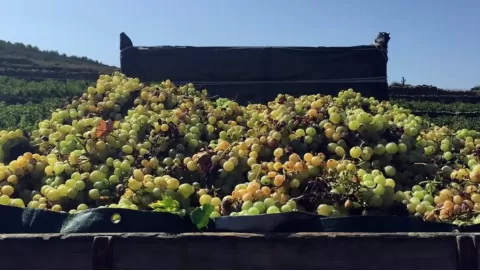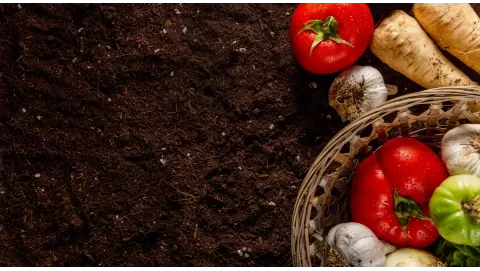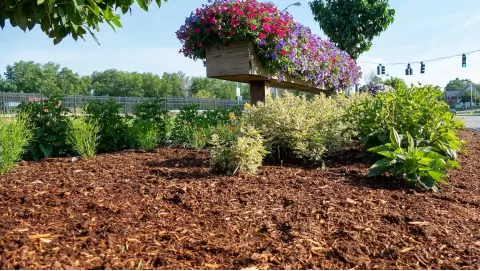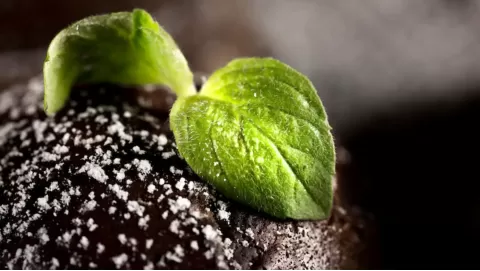
How to use vinegar as a natural weed killer: Safe and effective solutions
Weeds are a common nuisance for the gardener, homeowner and landscaper alike. Most people are looking to kill weeds without resorting to chemical warfare. They are seeking natural ways to maintain cleanliness and safety in their gardens and yards. This is why the use of eco-friendly methods of weed control is becoming ever more popular.
Using vinegar is one of the easiest and safest natural weed killers. It is also something that most kitchens use and does not harm the environment. Vinegar has what’s called acetic acid, which deprives the leaves of weeds of moisture and halts their growth.
Growcycle offers gardening products, including organic weed killer for driveways. They sell horticultural-grade vinegar, which is more potent than kitchen vinegar and works well to kill tough weeds.
Why Control Weeds Naturally
The simplest way to kill weeds is with a store bought weed killer, most of which are made using powerful chemicals. When it rains, these chemicals can wash away and contaminate the soil, nearby water and even food plants. This is known as chemical runoff, and it can be detrimental to animals, insects and people. These chemicals can also destroy the soil over time, making it more difficult for good plants to grow. Children and pets that play outdoors are particularly vulnerable if these chemicals are used frequently.
Vinegar is a safer choice. It breaks down rapidly in the environment and doesn’t leave behind toxic residues in the soil. This makes it a suitable choice for individuals wishing to grow plants in an eco-friendly manner.
Vinegar is widely available and inexpensive as it is readily available at home for most people and in grocery stores for sale. Stronger types, such as horticultural vinegar are also much less expensive than many chemical weed killers.
The Science Behind Vinegar as a Weed Killer
Most people are familiar with vinegar as a cooking ingredient, but it has the ability to kill weeds too. Knowing how it works may help gardeners use it more efficiently and safely.
Active Ingredient: Acetic Acid
The active ingredient in vinegar that kills weeds is acetic acid. This acid then rips the surface of the weed’s leaves and starts to break down the plant cells. It also draws moisture from the plant, leading to shriveled leaves that eventually die. This is also why vinegar is most effective on young weeds with tender leaves, which can dry out much faster.
Concentration Matters
Not all vinegar is the same. Most kitchen vinegar contains 5 percent acetic acid, which may work on small and young weeds. But horticultural vinegar contains a far more powerful concentration, typically 20% to 30% acetic acid. This more potent version is often used by professional gardeners or farmers, since it can kill hard weeds.
How It Works and Its Limits
Vinegar only kills what it touches like the leaves and stems of the weed. It doesn’t penetrate to the roots, so the weed can grow back, particularly if it has a deep root system. For this reason, vinegar is ideal against smaller, shallower weeds and may take numerous sprays to fully eliminate stronger or recurring weeds.
Best Natural Weed Control Methods
DIY vinegar weed killer is straightforward and economical. It helps control weeds without toxic chemicals by making a natural spray with just a few ingredients. Popular recipes for how to kill weeds with vinegar include:
Basic 3-Ingredient Formula
One of the simplest recipes consists of:
- 1 gallon white vinegar (5% acetic acid)
- 1 tablespoon dish soap
- 1 cup salt (optional)
The vinegar dehydrates the weed leaves, and the dish soap makes the mix adhere to the plant. Adding salt enhances the effect of the drying agent but may leech into soil if used in excess, so it is best for driveways, sidewalks or other areas without growth.
Enhanced Variations
To increase the strength or effectiveness of the spray, gardeners sometimes include additional ingredients:
- Baking Soda: A little baking soda may increase dryness, killing the weed faster.
- Citrus Oil Blend: A few drops of essential oil like orange or lemon can also help the vinegar to penetrate tough leaves and help the results.
Pet-Friendly Option
Safety is a top priority for pet owners. A more benign approach is to use regular vinegar without the salt. It can be spot treated directly onto the weed by spraying the weed only but not spraying the grass or plants around it. It needs more than one spray, but that way doesn’t hurt pets, soil or other plants.
Safe & Effective Application Techniques
Killing weeds with vinegar is straightforward, but the proper approach will make it safer and more effective. By tracking the weather, using the right tools and protecting surrounding plants, gardeners can have more success with lower risks.
Timing & Conditions
For best results, use vinegar on a sunny, dry day. But the vinegars work more quickly because the sun’s heat dries out the weeds. One must remember not to use it on a rainy or windy day as rain will rinse away the vinegar and wind may carry it to plants that one does not want to treat.
Application Methods
There are a few different ways to apply vinegar to the weeds. A spray bottle is perfect for covering small areas or spot treating, making it easy to target certain weeds. For larger areas, use a garden sprayer to cover more ground. Place the vinegar in a container and use a brush to paint it on the weeds. That way, one can be very exact, which can be helpful to be sure that one doesn’t kill other plants.
Protecting Desirable Plants
Vinegar can damage plants that it’s not intended to be used on, so there is a need to safeguard these plants. Another method is to use cardboard or plastic sheets to protect other plants from the spray. If a gardener is precise in how they apply it (or uses a paintbrush to apply it), they can make sure they only hit the weeds and not the surrounding plants.
Safety Precautions
Safety is vital when working with vinegar, especially when referring to a more substantial or corrosive type (20-30% acetic acid). Wear gloves, goggles, and long sleeves to protect skin and eyes from irritation, recommended. It’s also a good idea to avoid spraying on windy days and to keep pets and children away until the vinegar has dried. That makes using vinegar to kill weeds safe and effective.
Top Vinegar Weed Killer Products
Here are the best vinegar weed killer products:
1. Harris 128 oz (1 gal) 20% Vinegar Weed Killer
This 20% acetic acid powerful solution is a ready-to-use spray, so it’s four times stronger than standard household vinegar. It acts rapidly on broadleaf weeds and grasses, desiccating them on contact.
It is also OMRI-listed for organic gardening, so use it on certified organic gardens and pet-friendly yards. Ideal for killing weeds over larger areas, this vinegar weed killer offers a quick, chemical-free solution.
2. Harris 1 gal 30% Vinegar
The Harris 30% Vinegar concentrate is of high strength if people need something stronger. With six times the acetic acid one gets in regular vinegar, this horticultural-grade vinegar is effective on even the toughest deep-rooted weeds.
It also doubles as a powerful, eco-friendly cleaner, great for banishing grime on patios and counteracting odors. While more concentrated, it remains biodegradable and leaves little residue.
3. Harris 32 oz 20% Vinegar Weed Killer
In a smaller size than 1 gallon, Harris 32 oz 20% Vinegar features the same powerful formula, making it perfect for smaller applications.
It comes equipped with an ergonomic spray applicator for pinpoint targeting, minimizing overspray on desirable plants. This option is best for spot treatments or smaller weed control tasks around the yard or garden.
4. Liquid Harvest® 20% Vinegar
Liquid Harvest® 20% Vinegar is an EPA registered, horticultural vinegar that will provide excellent weed suppression. As this product conforms to federal guidelines for non-selective herbicides, it is best for large applications.
It can't be sold in California or Washington, but it is sold in other states, where gardeners and landscapers can use it to get to the root of virulent weed problems more efficiently.
5. Energen 1 gal Weed & Grass Killer (20% Vinegar)
A mixture of acetic acid with sea salt to dry out weeds and grass, the Energen is also a 20% Vinegar Weed & Grass Killer. The quick results is due to the moisture being sucked from the plant tissues killing the weed rapidly.
Housed in a one-gallon jug, it’s perfect for landscapers or homeowners needing to treat large swaths of weeds effectively all season.
Best Areas & Weed Types for Vinegar Treatment
Although vinegar is a powerful solution for weed control, it is essential to know where and how to use it to be effective. Here are the best places to use vinegar and what types of weeds it is most effective against.
Hardscapes
Vinegar is effective on hardscapes, such as walkways, driveways and gravel paths where weeds like to grow in between cracks. These are good areas if weeds typically have shallow roots, because vinegar can kill the tops of the plants without touching the underlying structures. Since the roots are less of a problem in this case, vinegar is a surprisingly effective weed killer, yet it'll do much less long-term damage.
Garden Beds
In garden beds, vinegar can be spot-treated on annuals or shallow-rooted broadleaf weeds. One should be cautious in applying the vinegar so it doesn’t hurt nearby plants, especially those with deeper or more developed root systems. Vinegar dries out the leaves of the weeds, but it won’t kill the roots, so repeat applications may be necessary for tough weeds.
Lawns & Turf
Applying vinegar to lawns and turf, in particular, is more of a challenge, as it can kill grass. It needs to be applied only to barren spots or in targeted areas where weeds are taking over and are a concern. Since vinegar kills everything it touches, including the lawn, it needs to be selective with the application.
Tight Spaces
For narrow openings, like cracks in pavement or joints between stones, in lieu of vinegar, one can use boiling water. Boiling water can be poured into the cracks without harming the surrounding area and virtually all the weeds will die. This will come in handy where one might not want to use vinegar or where applying it might be too difficult.
Vinegar vs Other Natural Methods
Using vinegar as a natural weed killer safe for pets is a superb, safe, natural option and there are also other DIY natural solutions to try. Every option has its benefits or downsides, so it’s important to know how vinegar stacks up against other natural weed controls.
1. Baking Soda & Salt
Both baking soda and salt work by dehydrating weeds, drawing moisture out of them. Osmotic stress is created by the baking soda drawing water out of the weed’s cells, ultimately dehydrating it.
Salt also dries out weeds, but can damage soil if overused. Both methods work like vinegar, but salt can be especially inhospitable to soil. Both have to be used cautiously in garden beds or lawns.
2. Boiling Water
While boiling water instantly kills weeds through scalding the plant tissue, it is non-residual. That means it can kill weeds on contact but the area will have to be treated again if weeds return. Whereas vinegar works by dehydrating the weeds, boiling water causes physical damage to the plants and their roots. This method is best for small, targeted areas like cracks or pavement joints, where other methods may be more difficult to use.
3. Essential Oils & Alcohol
Essential oils like clove oil, cinnamon oil, and lemongrass oil can be combined with alcohol to make a multi-purpose weed killer. These oils work by getting into plant membranes and tearing apart cellular function, killing the plant.
The use of alcohol assists in breaking down the plant’s outer layers, accelerating the process. One has to be careful with essential oils, as they are potent and can kill surrounding plants.
4. Corn Gluten Meal
So corn gluten meal acts differently than vinegar. It’s a pre-emergent control, which means it stops seeds from germinating instead of killing weeds already there. It is most effective when used before weeds sprout, and then controls the assortment of weeds that emerge over time.
Corn gluten meal does not act the way vinegar does in targeting weeds after they have already sprouted, but it does help control the weeds that come up in subsequent years without harming other plants.
FAQs
What kills weeds permanently naturally with vinegar?
Vinegar is effective at killing weeds by drying out their leaves and stems, but it doesn’t kill the roots, so the weeds may come back. As with all herbicides, it can kill off the top growth, but multiple treatments may be needed to limit regrowth.
Is vinegar safe for weed plants?
Vinegar is considered toxic to weeds, but it works by desiccating the weeds upon contact. However, it is important to note that vinegar can also harm desirable plants if it is sprayed on them, as it is damaging to their cells and leaves.
What is the ratio of vinegar to water for weed killer?
The most common ratio for a homemade vinegar weed spray is 1 part vinegar to 1 part water. That means half vinegar and half water in a spray bottle.
The Bottom Line
For weed control, vinegar is a natural, effective, and eco-friendly solution. This makes it easy to find and easy to use and a great natural weed killer alternative to chemical counterparts. Stronger vinegar, for example, horticultural vinegar, will increase effectiveness but vinegar is most effective on young, shallow-rooted weeds. By learning how vinegar works to kill weeds, creating their homemade vinegar weed spray, and using it wisely, gardeners can maintain weed-free gardens without damaging the environment.
Growcycle is a marketplace for quality products. They offer a range of vinegar-based solutions that work great against difficult weeds. From regular vinegar to stronger horticultural vinegar, these products make weed control simple and natural.
Disclaimer: This material is for informational purposes only and should not be relied on for legal, medical, financial, or any other form of professional advice.





















